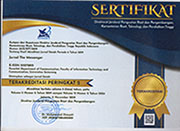Group Dynamics in the Cyberspace (Case Study on Komunitas Blogger Jogja and Loenpia Dot Net )
Abstract
Context of this study derived from communication studies, emphasizes on the perspective of a cultural shift as a result of the cyberspace phenomenon as an impact of the current-computing technology, and the changing patterns of information transmission and communication. Researchers conducted indepth interviews, towards the members of a bloggers community, such as 'Komunitas Blogger Jogja' (bloggerjogja.org), and 'Loenpia Dot Net' (loenpia.net/blog) which is a bloggers community based in Semarang.This research use qualitative analysis with descriptive approach.As results, group dynamics that are developed by each community, corresponds with the community character and nature, to maintain the self-existence. Member of bloggers community maintain the existence of his/her bloggers community, conducted by interacting on a regular basis amongst community members, as well as build awareness for the netizens by upload various information on his/her personal blog, linked with community web page.
Keywords
Full Text:
PDFReferences
APJII, T., & Puskakom, U. (2013). Profil Pengguna Internet Indonesia 2012. Jakarta: Asosiasi Penyelenggara Jasa Internet Indonesia.
APJII, T., & Puskakom, U. (2015). Profil Pengguna Internet Indonesia 2014. Jakarta: Asosiasi Penyelenggara Jasa Internet Indonesia.
Blanchard, A. L., & Markus, M. L. (2004). The Experienced Sense of a Virtual Community: Characteristics and Processes. ACM SIGMIS Database: the Database for Advances in Information Systems, 35(1), 64-79.
Bouas, K. S., & Arrow, H. (1995). The development of group identity in computer and face-to-face groups with membership change. Computer Supported Cooperative Work (CSCW), 4(2-3), 153-178.
Citizenship. (n.d.). Retrieved March 30, 2015, from https://www.merriam-webster.com/dictionary/citizenship
Forsyth, D. R. (2006). Group Dynamics 4e [International Student Edition].
Heick, T. (2013). The Definition Of Digital Citizenship. Retrieved March 30, 2015, from https://www.teachthought.com/the-future-of-learning/the-definition-of-digital-citzenship/
Klaffke, T. (2014). Top Trends in Indonesia. Retrieved March 30, 2015, from https://vdocuments.mx/indonesien-trendreport-2014pdf.html
Koh, J., Kim, Y. G., & Kim, Y. G. (2003). Sense of virtual community: A conceptual framework and empirical validation. International Journal of Electronic Commerce, 8(2), 75-94.
Lincoln, Y. S., & Guba, E. G. (1985). Naturalistic inquiry. Sage.
Lister, M., Giddings, S., Dovey, J., Grant, I., & Kelly, K. (2008). New media: A critical introduction. Routledge.
McKenna, K. Y., & Green, A. S. (2002). Virtual group dynamics. Group dynamics: theory, research, and practice, 6(1), 116.
McMillan, D. W., & Chavis, D. M. (1986). Sense of community: A definition and theory. Journal of community psychology, 14(1), 6-23.
Yohana, N., & Wulandari, T. (2014). Communication Groups Behaviour of Kaskus Virtual Community of Riau Raya Region. Jurnal Penelitian Komunikasi, 17(2).
DOI: http://dx.doi.org/10.26623/themessenger.v11i1.812
Refbacks
- There are currently no refbacks.
Copyright (c) 2019 Jurnal The Messenger
View My Stats [Jurnal The Messenger] is an International Scientific Journal, Published by the Department of Communication, Faculty of Information Technology and Communication, Universitas Semarang (Central Java, Indonesia). It is licensed under a Creative Commons Attribution 4.0 International License.



_11.jpg)




_BARCODE.jpg)
_BARCODE1.jpg)


5.png)










2.png)





